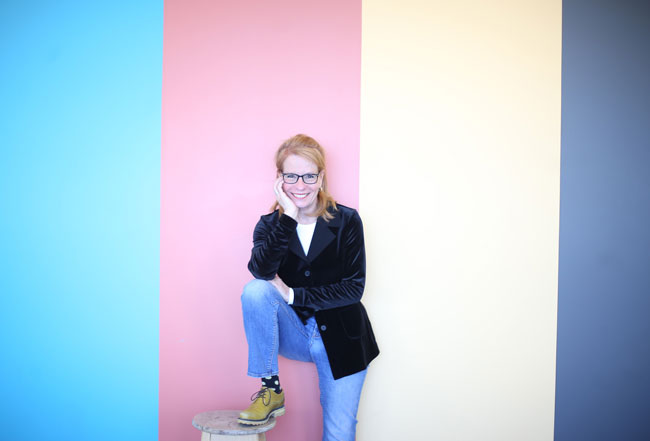
By James Martin
Yesterday, Louise Richer handed in her final paper for her MBA. Now she needs to shop for a dress – but it’s not to wear with cap and gown at her convocation ceremony. It’s to wear when she receives the Order of Canada later this year.
Shopping for a Rideau Hall wardrobe isn’t a typical student concern, but Richer isn’t a typical student. The 63-year-old psychologist-turned-stand-up-comedian-turned-educator is the founding director of École nationale de l’humour. For 28 years, the Montreal post-secondary institution has offered a varied, interdisciplinary education to aspiring funny people; its graduates include Quebec stars such as Cathy Gauthier, Louis-José Houde, Patrick Huard, Martin Matte, Louis Morissette and Mike Ward. Richer is passionate about the role that humour plays in our lives, and she laughs a lot.
“It was quite surprising,” she says of the letter she received from Governor General (and McGill principal emeritus) David Johnston, “but I’m quite honoured. Receiving the Order of Canada is a recognition of the contribution of the École nationale de l’humour, and it’s a recognition of the contribution of humour in our cultural patrimoine. Humour is a great mirror of who we are as individuals and as a society – and it’s as important as the other arts. The battle for the recognition of its contribution to cultural life is something I’ve fought for, for many years.”
When asked why, at an age that many people are thinking about retiring, Richer decided to go back to school – while maintaining her full-time duties at the thriving École nationale de l’humour – her response is, you guessed it, laughter.
She catches her breath long enough to elaborate: “I think we have a responsibility to ourselves to stay stimulated and stimulating. I have this need to learn and to take risks. You learn when you destabilize yourself. And [going back to school] was quite the destabilization!”
She laughs again.
“It was very demanding,” she says of the McGill-HEC Montreal Executive MBA. The 15-month-long program is designed for experienced professionals, allowing them to study while still working. It’s an intense learning experience. “There were moments where I was flirting with burnout,” admits Richer. “For me, the Accounting and Finance module was a nightmare. I’ve always done well in school, but for the first time, I found myself listening and understanding nothing. I’d go home on the metro and think ‘I’m not going to make it!’ But I worked hard. I’m not going to be an accountant, but for [dealing with financial matters at École nationale de l’humour] it gave me better comprehension. I’m a better manager now.”
“It was very stimulating,” she adds. “I had great peers and great professors. It was really incredible. But working and doing the EMBA at the same time?” She exhales. “I’m tired, but with a smile on my face.”
There are 40 people in Richer’s EMBA cohort, which began its studies in August 2014. Although she’s the only psychologist/comedian/administrator in the class, it’s a diverse group representing 21 industries. One of her colleagues is the head of a major video game company. Another is the chief of a First Nations band. There is a president of a restaurant group, and the head of an initiative that promotes Switzerland as a global business partner.
“Our programme tries to maximize diversity in the classroom,” says Alain Pinsonneault, director of the EMBA. “It was a big plus having Louise with us. She brought a very different perspective from the other students. She’s a very dynamic, very curious person. She can understand and analyze complex problems from different perspectives and that’s because of her background; humour is about understanding things from a different angle.”
Pinsonneault notes that Richer wasn’t the class clown. “She was serious and dedicated,” he says, before himself laughing and adding, “She was very ‘business-ish’!”
On Feb. 5, Richer and her EMBA cohort will mark the end of the program with a conference during which they’ll present their final applied research papers. In addition to traditional performer training, the École nationale de l’humour does humour training for workplaces. Richer’s paper expands on that initiative. She interviewed top executives at Banque Nationale, Transcontinental, Telus and other large companies, exploring whether humour played a role in their work cultures – and how they use humour as leaders.
“They couldn’t start their usual speeches, because they were on new ground,” recalls Richer. “It was incredible what came out because they were reflecting while we were talking together. Humour is important in innovation. It’s important in communication – and being a good leader means being a good communicator – because it brings you closer to people faster. It’s important in recruiting; a sense of humour can be an indication of relational capacity. Humour is important in so many things, and those conversations were very revealing. It was just incredible.”
Richer plans to continue this exploration. “Humour and business is becoming a big research area,” she notes. “Research is showing that although money is important, the main thing [for employees] is feeling good at work. Especially for younger people; the motivational systems for the new generation are a revolution. It’s not the carrot and the stick anymore. Human capital is the main concern around the world. It’s not operational excellence. It’s not innovation. It’s the work climate, it’s attraction, it’s retention. More than ever, humour is an ingredient in all that.”
As for that new dress, Richer will have plenty of time to shop. There are three Order of Canada ceremonies throughout the year; she doesn’t know which one will be hers, but has been promised two months advance notice. “I have to buy a long dress for the first time in my life,” she says, noting that it will be a dramatic break from her usual style. “Unless,” she muses, “I can wear a long dress and jeans. We’ll see.” No surprise, she bursts into laughter.
